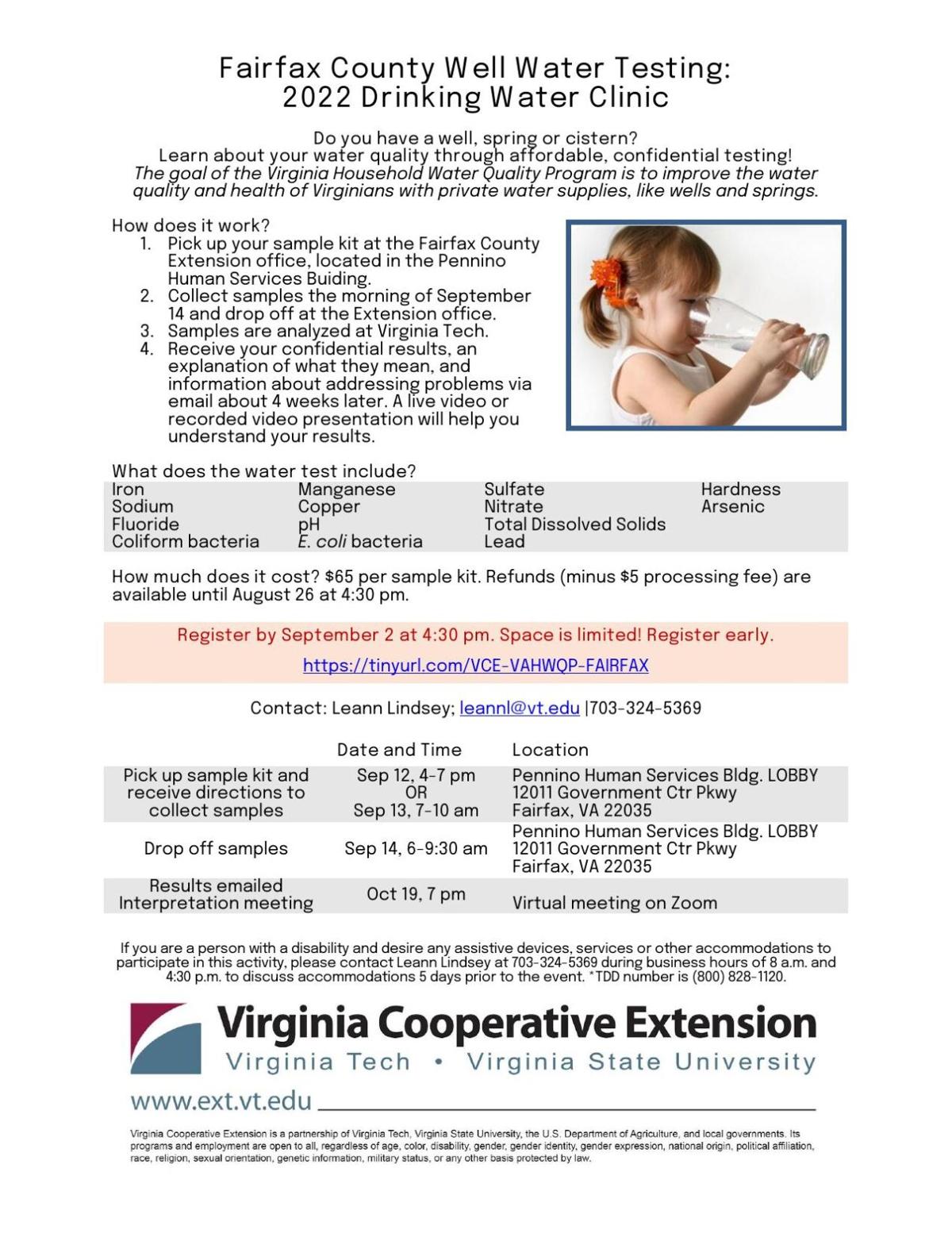The Best Guide To Well Water Testing
Wiki Article
Our Well Water Testing Ideas
Table of ContentsThe Well Water Testing DiariesThe Definitive Guide for Well Water TestingThe Best Strategy To Use For Well Water TestingThe Best Guide To Well Water Testing

Government agencies do not keep an eye on or control water quality secretive wells, and water screening is not called for by any type of federal or state regulation. If you are one of the 1. 7 million Georgians with a personal well, you are responsible for the top quality and safety of your well water.
Effectively created and kept water wells can provide several years of trouble-free service. Surface area pollutants might go into the well if it is not correctly created and preserved, and the well might at some point degrade or come to be damaged as it obtains older. Additionally, some groundwater naturally contains one or more chemical substances at degrees above the EPA's health-based standards, called the Optimum Pollutant Degrees (MCLs)
Test the water when each year for complete coliform bacteria, nitrates, overall liquified solids and p, H levels. If you suspect various other contaminants, you need to examine for those. On the other hand, the top quality of water in defective wells may change suddenly and remain unnoticed as the water might look, odor and taste the exact same.
The Of Well Water Testing
Minimum Testing Recommendations Well, Upkeep Annual All geographical areas Nitrates (Total Nitrate and Nitrate+Nitrite) Yearly Annual Fundamental Water Chemistry (see listed below) plus Alkalinity, Soluble Salts (or Total Dissolved Solids), Nitrate, Chloride, Fluoride and Sulfate Originally and then every 3 years p, H, Firmness, Aluminum Calcium, Chromium, Copper, Iron, Magnesium, Manganese and Zinc Each year after initialcomprehensive water chemistry Extra Examining Suggestions Confirmation of Potential Contamination At least when and afterwards yearly follow-up for:1) homes with pipes that pre days the 1987 plumbing codes with copper piping with lead solders2) older homes in which there are lead pipes3) houses with brass and/or chrome fixtures (brass has 3-8% lead; chrome components includes lead) All geographicalregions A minimum of once and afterwards a yearly follow-up Southern Coastal Level region below the "Loss Line" on the, Georgia map A minimum of once and afterwards a yearly follow-up Piedmont-Blue Ridge areas over the "Autumn Line" on the Georgia map Volatile and Semi-volatile Organic Substances, Chemicals, Petroleum Hydrocarbons and Various other Organics Not called for on a regular interval; recommended just when contamination is suspected. Well Water Testing.
Samples gathered from a kitchen faucet would show the resource water homes plus any possible contamination from the well proprietor's supply of water system. For instance, tasting at the wellhead for lead is not required, but tasting from the tap for lead would certainly indicate if lead solder was used in the plumbing.

The primary MCLs have actually been evaluated focus that provide a vast margin of security from damaging health and wellness results for lots of people over a life time of alcohol consumption. Also though primary MCLs are enforceable criteria for PWSs just, useful site personal well proprietors may select to follow these requirements to protect themselves from the potential health and wellness danger of drinking polluted water.
Top Guidelines Of Well Water Testing
The alcohol consumption water standard for nitrate is 10 ppm; over this level nitrate can have negative impacts on human health, particularly babies under the age of 6 months. Chemicals are compounds made use of to protect against, damage, fend off, or mitigate parasites.Cyanazine breaks down in the setting right into various chemicals. Several of the breakdown items of cyanazine have been spotted in Minnesota water. Chemical analysis in water examples can be pricey and using certain chemicals can vary throughout the state making it tough to understand which pesticide to assess.
Based upon this, we suggest that you speak to the MDA before tasting your well for chemicals. The advancing or compounding wellness risk associated with low degrees of several chemicals in drinking water is not well recognized currently. Well Water Testing. In general, at risk populations such as babies, kids, and pregnant/nursing women are at best risk
More than 70,000 private wells click here for more info owners will be used nitrate testing in over 300 territories.
A Biased View of Well Water Testing
The MDH suggests utilizing an approved lab to check your water. To recognize a lab to have your well water checked, most likely to Minnesota Department of Health (MDH) Certified Environmental Laboratories. The customized search tab on this web page allows you to search for a research laboratory that approves samples from private homeowners.When possible, it is best to eliminate sources of contamination or replace a polluted water system with a more secure water supply rather than count on a home water therapy unit. The cost to evaluate for chemicals in water may go beyond the expense of a point-of-use home therapy system, such as reverse osmosis for alcohol consumption water.
If you choose to mount a home water treatment unit, the device (or systems) you choose must be accredited and identified to decrease or get rid of the compound you are concerned concerning. If there is more than one compound you want gotten rid of from your water, you may require to combine numerous treatment processes right into one system.
Report this wiki page